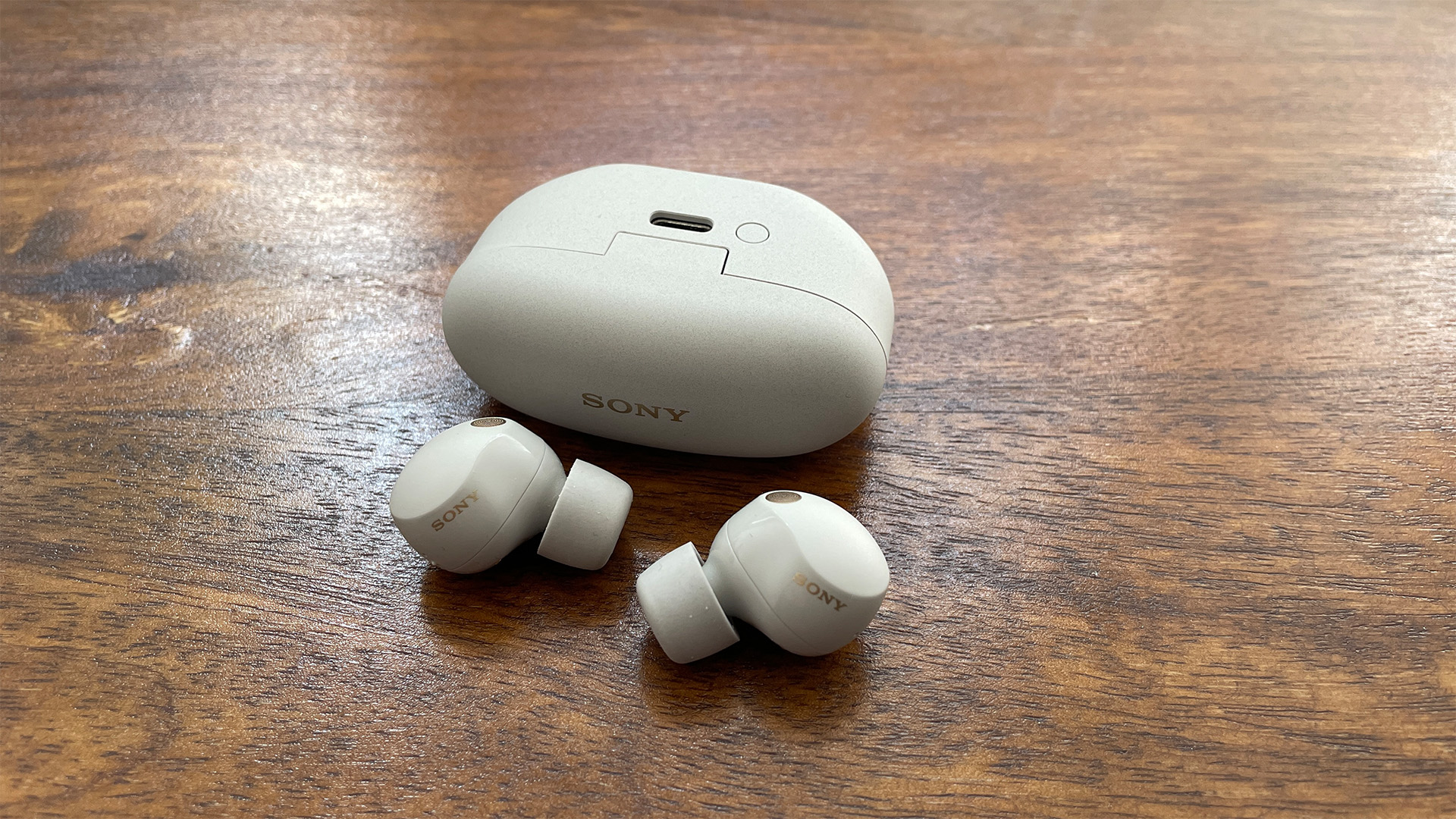What Hi-Fi? Verdict
The EF-12 is a strong portable projector at its price – as long as the lack of a battery isn't a deal-breaker
Pros
- +
Tidy build
- +
Strong black depth and dark detail
- +
Decent sound system
Cons
- -
Colours lack complexity
- -
Mains power only
- -
Some key missing apps
Why you can trust What Hi-Fi?
The Epson EF-12 is one of an increasing number of devices that aims to fill the gap between true home cinema projectors and truly portable projectors.
Unlike a true home cinema projector it has a proper built-in sound system and a smart platform, enabling it to perform as a self-contained cinema system. It's compact and light, too, so can be picked up and moved on a whim.
But, unlike a truly portable projector, it lacks an integrated battery so requires proximity to a mains socket. Think garden cinema rather than campsite cinema.
So, that's the Epson EF-12's niche – how well does it perform?
Build
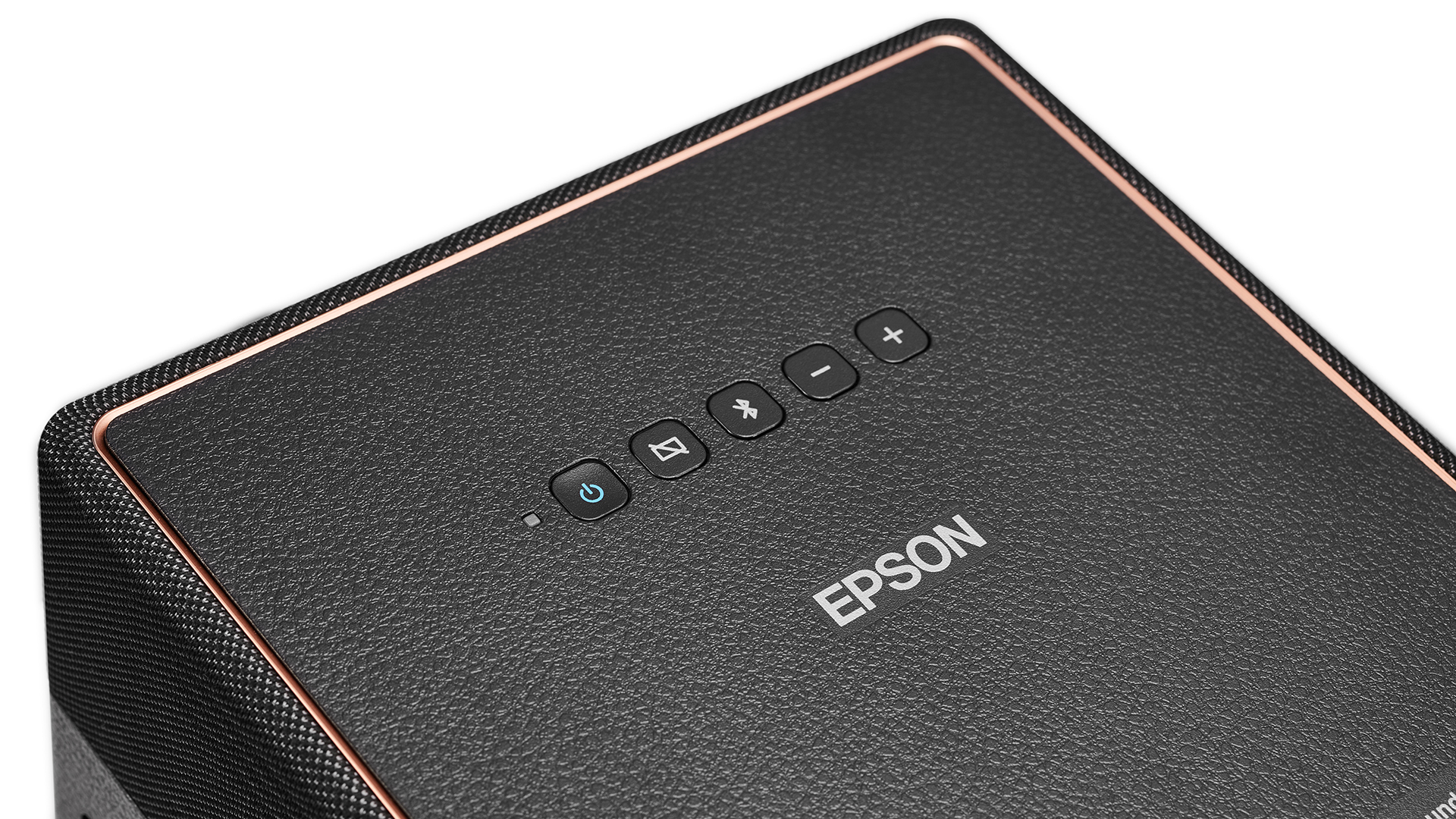
The only way this projector could look any more portable would be if it had a carry handle – and we’re surprised it doesn’t. Its compact dimensions give it a wonderfully small and accommodating footprint. It could sit as happily on a coffee table as it could on a kitchen worktop.
That flexibility is particularly handy given that this is a fixed lens projector, meaning that the only way to make the image bigger or smaller is by moving the EF-12 closer to or further from your screen.
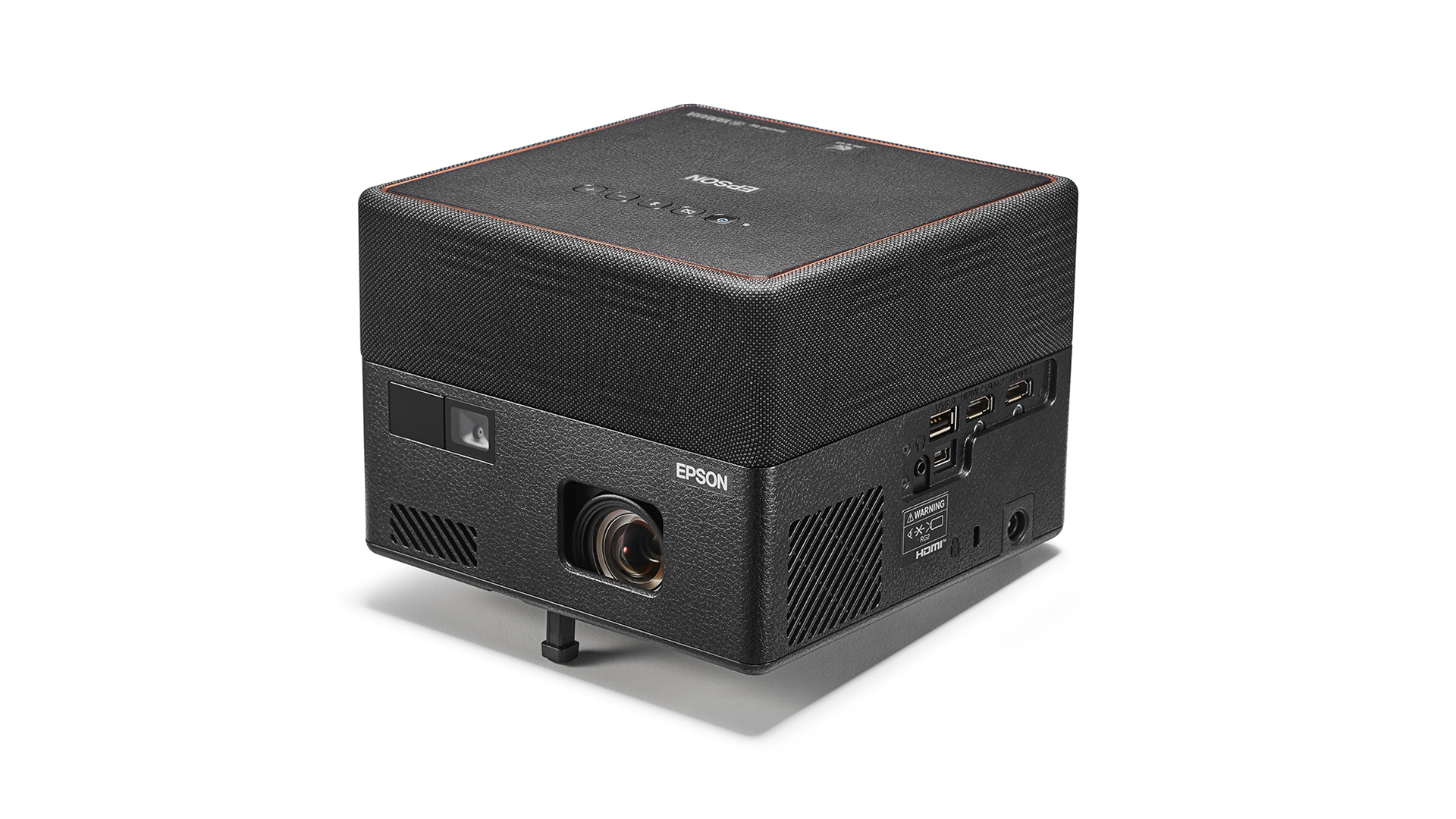
Type 3LCD laser projector
Image size 30-150in
Chromecast built-in Yes
Brightness 1000 ANSI-lumens
Throw ratio 1:1
Internal storage 10GB
Dimensions (hwd) 14 x 18 x 18cm
Weight 2.1kg
Fortunately, there’s plenty of scope with projection angle too. The amount of keystone correction available (± 34° vertically and ± 40° horizontally) means that the EF-12 doesn’t need to be face-on to get a decent image. It can also automatically focus and shape the picture without you having to get involved, although we do find that small manual keystone and focus adjustments are worth taking time for.
The latest hi-fi, home cinema and tech news, reviews, buying advice and deals, direct to your inbox.
The EF-12 can prop itself up to a decent angle using a little retractable kickstand at the front that will be familiar to Epson projector users. There are also sturdy-looking ceiling and wall mounts included in the box if you’d like to create a regular position for your main viewing space.
While there’s no weather-proof rating on the EF-12, it’s clear that Epson sees it as compatible with back garden viewing. The boxy build certainly helps here – the lens is nicely shielded and the protective finish on the outside gives the impression it could survive toppling off its perch.
We’d like to have seen a battery inside to give this projector some real freedom, but a garden extension cable is your friend here. If your wi-fi doesn’t reach that far, you can play local film files through the USB port or from the 10GB of internal storage. There are also two HDMI sockets (ARC and HDCP 2.3 compatible).
For the built-in audio, there’s a Sound by Yamaha 2x 5W sound system. The two drive units face the rear corners to cover the viewing position. That HDMI ARC means you can use a soundbar if you prefer and there’s also a 3.5mm audio-out socket for headphones. But Epson is confident you’ll like the Yamaha set-up and has included Bluetooth so you can turn the EF-12 into a wireless speaker for music playback.
There’s a row of buttons on the top surface of the device for power, Bluetooth and volume but the handy remote control should cover every function you need, from autofocus and auto-keystone to direct access to the system’s app offering.
Features
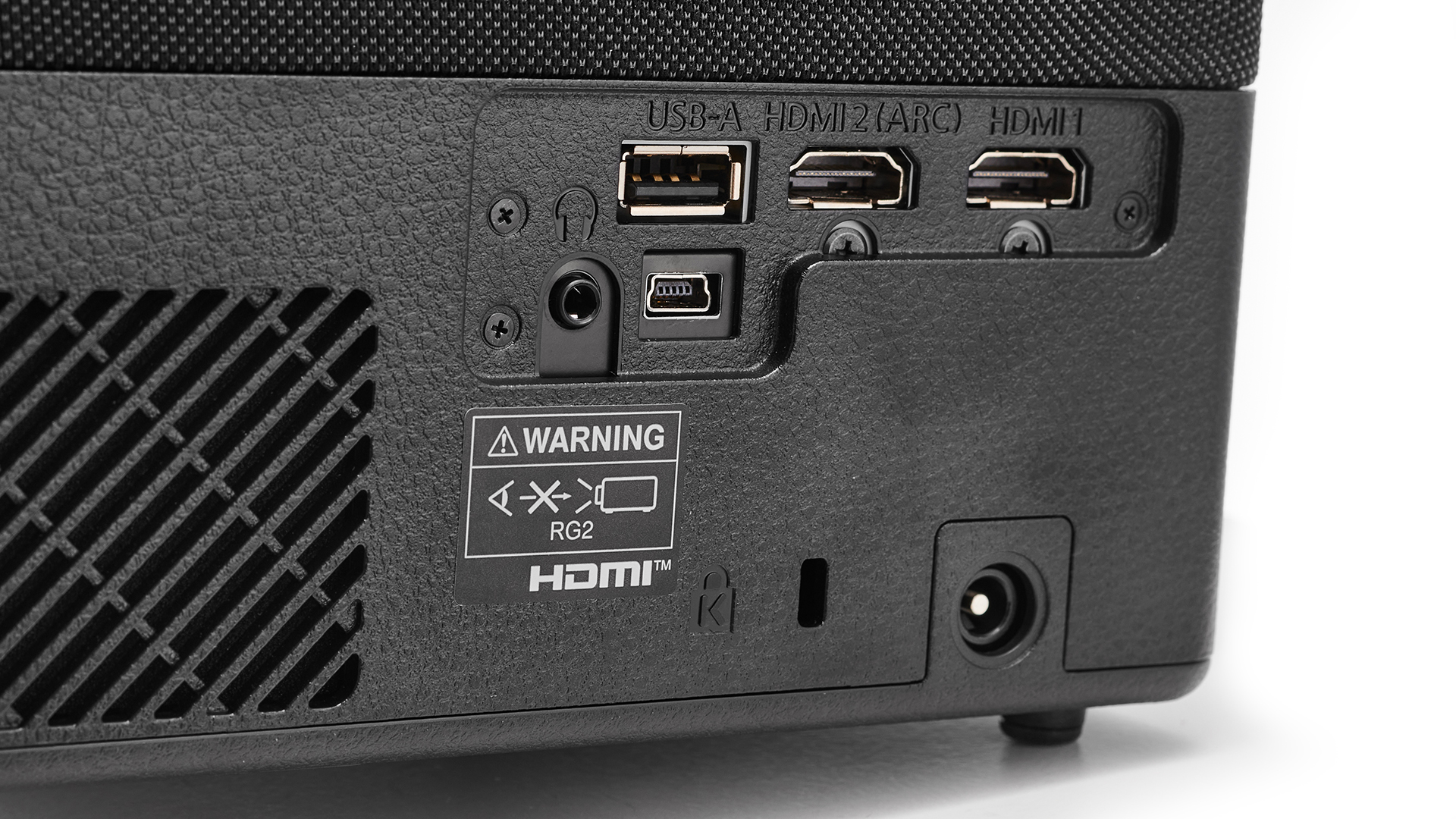
The EF-12 is another in Epson’s long line of 3LCD models. That’s three 0.62in LCD panels with a Full HD pixel count on each – one for red, green and blue, which can all be combined to create a 1920 x 1080 full-colour image on screen.
The 1000 lumens laser light source shines through these liquid crystal panels and that brings almost-instant on/off advantages over traditional lamp-based models, as well as an expected lifetime of up to 10 years, even if you watch one film every day. The other huge bonus is the quiet operation, the noise level is quoted as just 27dB, which is significantly lower than conventional machines because the EF-12 has no mercury lamp to keep cool.
Crack into the Android TV OS, though, and you can forget about all that. Settings are fairly limited and reasonably well integrated with the rest of the platform and, if you have used Android TV before, there won’t be many surprises here. Apps are of prime importance to the experience and you’ll find them on the homepage. You can access the Google Store to add the ones you need, including Amazon Prime Video, Plex, Tidal, VLC, Spotify, BT Sport, ExpressVPN and Disney Plus, along with some more specialist options.
What you won’t find, however, are popular services such as Netflix, BBC iPlayer, All 4 and Now, plus a few others. Compared with TVs, projectors are relatively small fry for these services, and it’s not unusual for portable machines such as the EF-12 to have some app gaps. All the same, it makes you wonder whether a non-smart projector and an HDMI media streamer might be a better and cheaper way to go.
Fortunately, the Google operating system means that Chromecast is on board and it’s possible to cast most missing services from your mobile, tablet or laptop to your projector – the main exception here is Apple TV. The other plus point is Google’s voice search facility, which removes plenty of the hassle of tapping away on virtual keyboards.
Picture
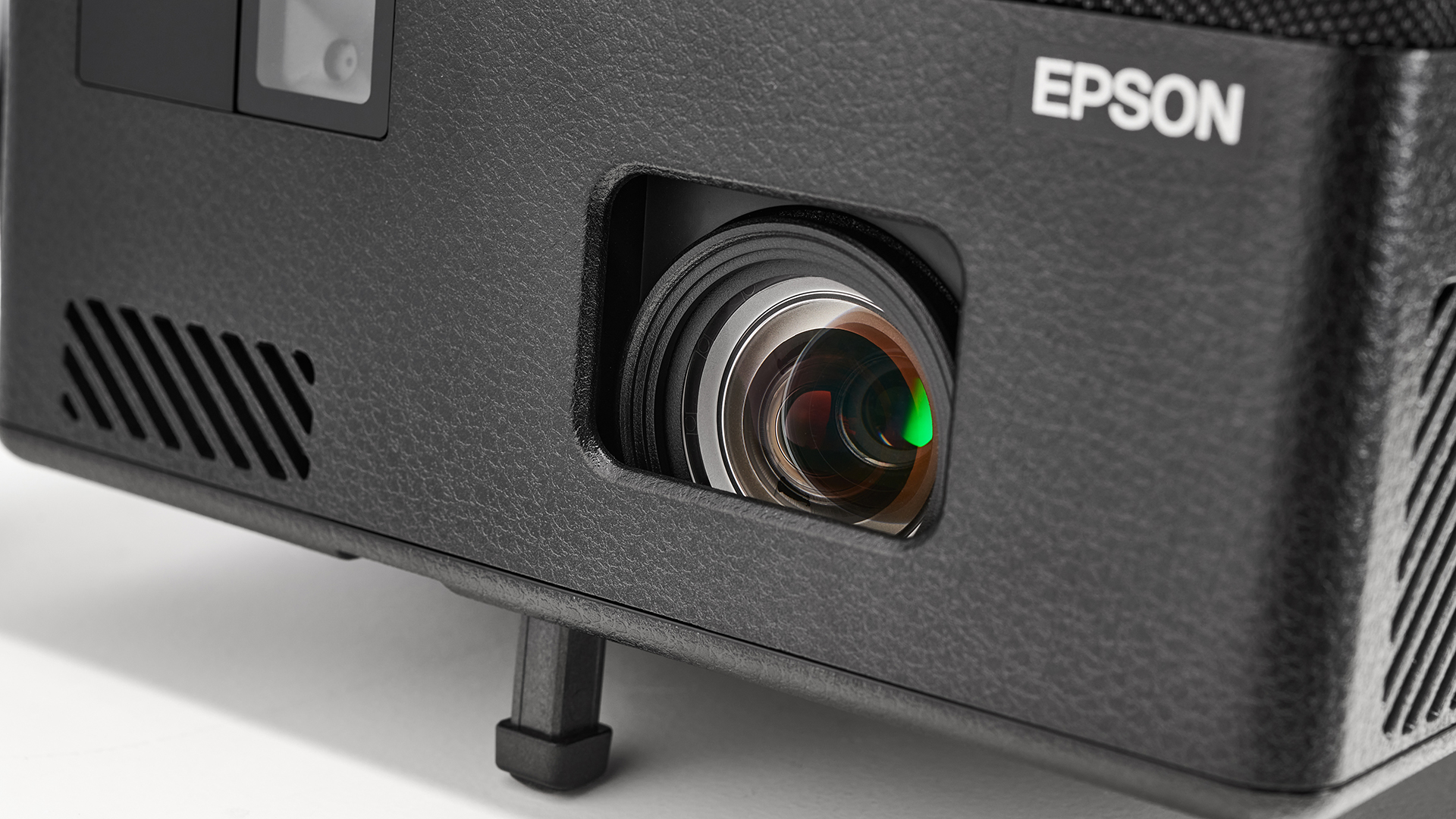
While 1080p is as much resolution as you’ll get out of the EF-12, it can handle a 4K input and even support HDR10. While watching Deadpool on 4K Blu-ray we get a good feel of the difference in punch that makes. The three superheroes stand out brilliantly as they swagger towards their big showdown with Ajax at the shipyard.
There’s a black depth on offer that just isn’t there with Epson’s similarly-priced, lamp-based machines. We feel as if we’re getting value out of our 4K Blu-ray, even though it’s not hitting that top-level resolution. The heroes’ outfits look bold, the sky bright and blue – it’s an exciting, attention-grabbing picture.
What’s also impressive is how well this machine handles motion. There’s no adjustable frame interpolation built-in, but its native skills are enough to make all the action easy to view. There’s a little judder but no blur to worry about as Deadpool leaps through the air relieving henchman of their body parts.
Taking it down to this projector’s native Full HD, the picture on Jupiter Ascending on Blu-ray is much the same. It’s strong, dynamic and thoroughly enjoyable to watch the opening sequences introducing the eponymous heroine.
Dark detail is just as impressive as traditional home cinema projectors of a similar price and the added black depth of the EF-12 makes the scene even easier to understand. It brings excellent context to the moonlit moment on the cargo vessel when Jupiter comes into the world.
It’s possible to appreciate how alone they are on the cargo ship in the Atlantic, inside the candle-lit shipping container. Watched on equivalent lamp-based 3LCD projectors, the picture is too washed out and that narrative is lost.
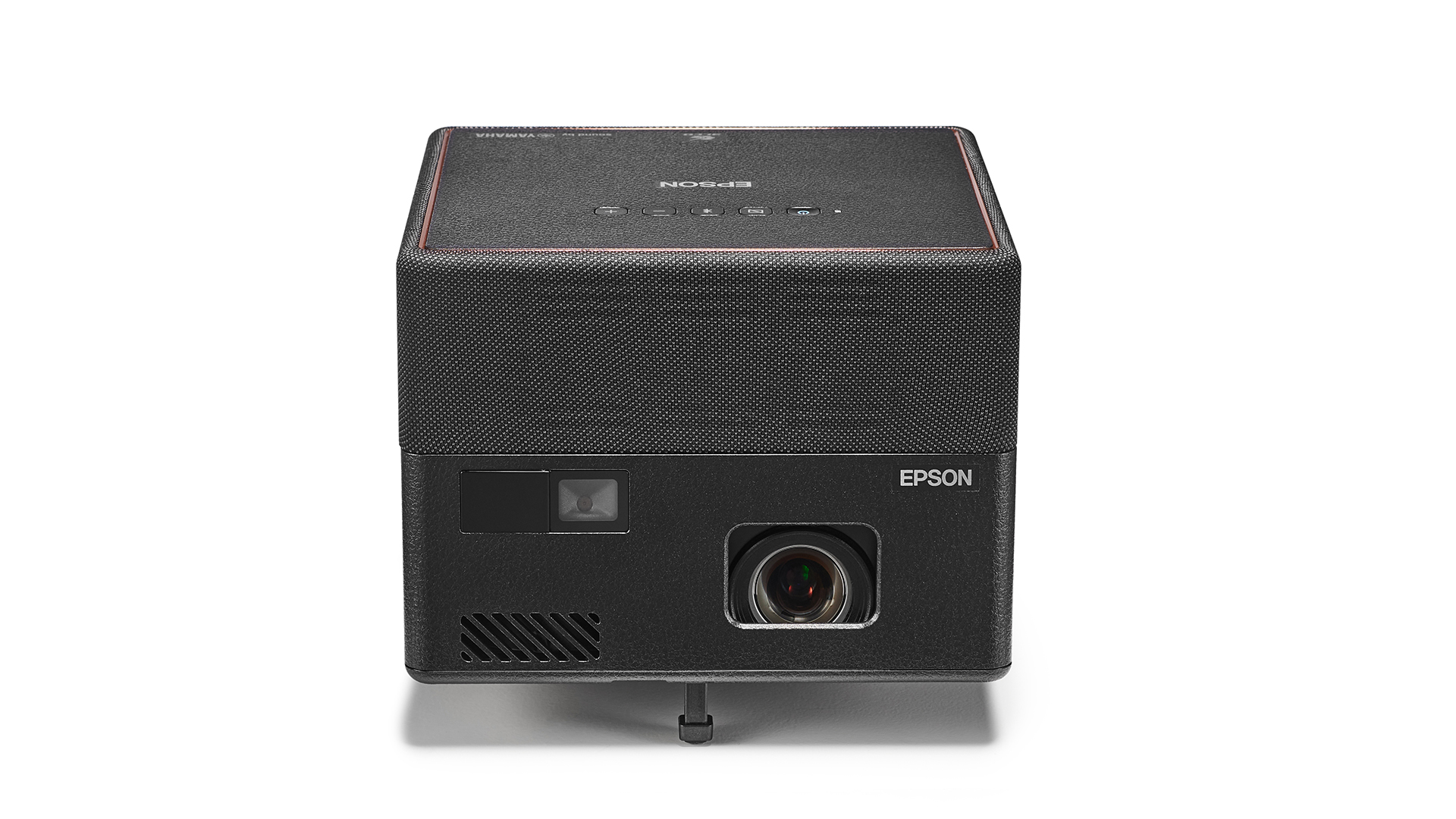
It doesn’t all go the way of this laser machine, though. Even compared with the cheaper Epson EH-TW650, the EF-12 isn’t as bright, especially as you’ll need to lower the light output setting a touch to get the best possible picture. That’s worth considering if you’re looking to use the EF-12 in a setting with some ambient light.
It isn’t quite as subtle an image when it comes to tone and detail either. It doesn’t manage as much nuance to colour as the best non-portables, nor deliver quite as much in the way of shading. As is often the case, this is most noticeable when rendering skin tones and scenes of mixed exposures when there’s no HDR to help.
The best preset to work with is the Cinema mode. Kick the colour temperature up a touch to reduce the golden tinge and take up both the Brightness and the Adaptive Gamma. Find that balance and you’ll still get a picture that’s strong and exciting while maintaining the broad strokes of textures such as Deadpool’s red stitching and black leather epaulettes.
With standard definition, the EF-12 still produces a decent picture. The Camden crescent in Lady In The Van on DVD is easy on the eye. There’s no noise, plenty of colour and it’s a sharp picture for the money. It’s not quite as forgiving as Epson’s softer, lamp-based projectors at SD, but there’s plenty of interest when it comes to the wrinkles on Maggie Smith’s face, even if it can’t quite manage the feel of the warm glow of the afternoon sun that the TW650 can capture.
Sound
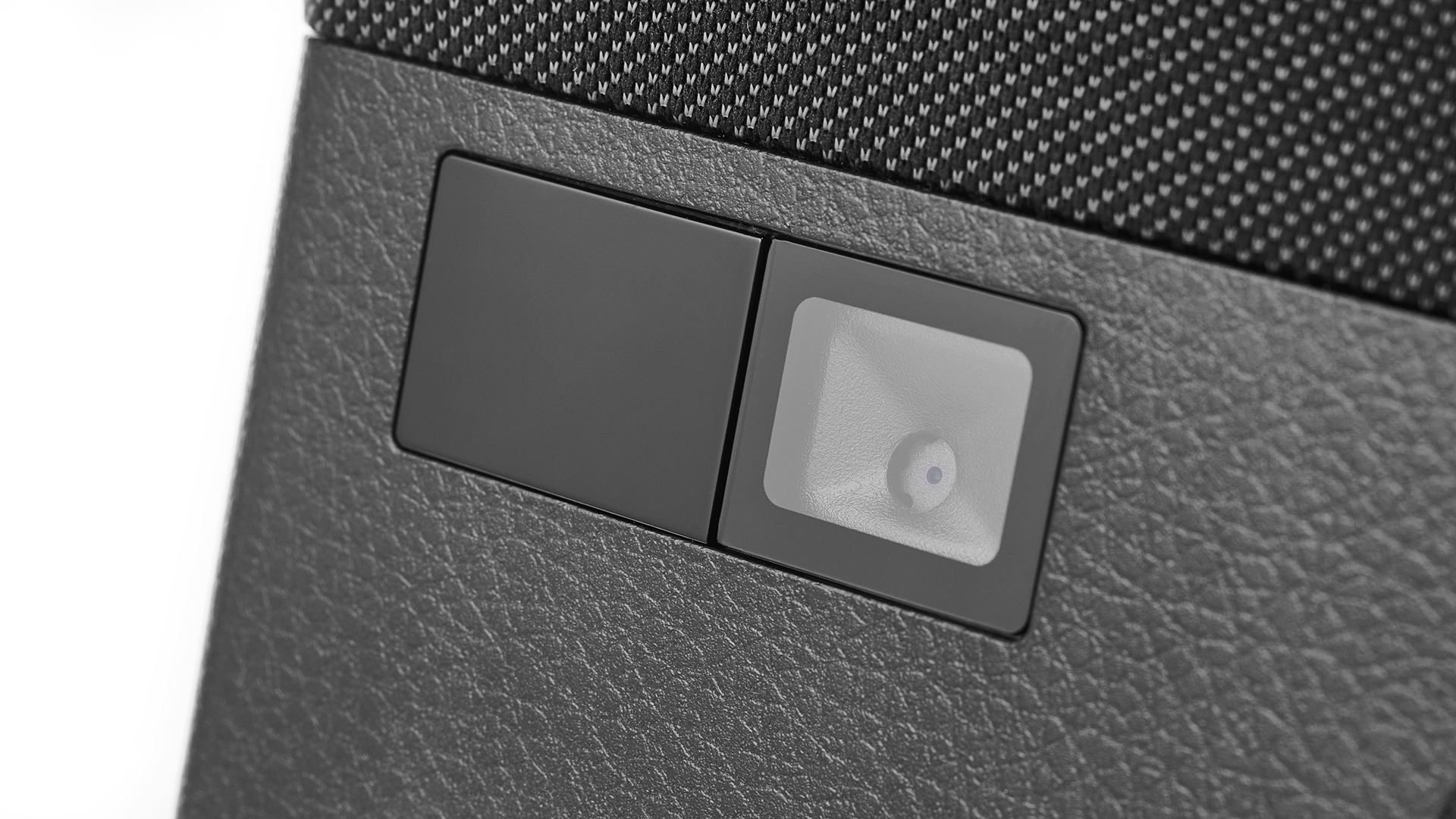
The mono sound systems built into home cinema projectors can be a bit of a waste of time, that’s not the case with portables and particularly not with the Epson EF-12. Yamaha and Epson have done a good job with this audio set-up.
There are some filters to play with but, for the best quality audio, switch off the Clear Voice, Auto Loudness and Bass Extension modes and even the Virtual Surround too. Left in the Theatre preset, it’s a remarkably expressive system with just enough precision to hold its own even in scenes with heavy action, such as the alleyway fight in Jupiter Ascending.
Even this hectic encounter comes across well without turning into a mess. We can just about pick out all the laser pulses, the voices, explosions and movement of the characters and that’s no mean feat for a small box like this. There’s even a really nice hum to Channing Tatum’s plasma shield, showing off the Epson’s dynamic skill.
For music playback, it’s a touch thin compared with most wireless speakers but is a perfectly acceptable music machine. Listening to Blue Monday by New Order, there’s enough punch to keep the electro bassline bouncing along with plenty of pace. There’s a relatively good feel of weight and just about enough rhythmic grasp to hold the tight drum pad beats together.
Most impressive, though, is the easy balance across the range almost all the way up the volume settings. There’s plenty of sound too – enough to have a good stab at filling our sizeable AV test room. Sensibly, the two drivers point back towards the seating position and, throughout our test, we never feel the urge to plug in a soundbar. An external speaker would, of course, make for a far better audio experience, but what’s included here is good given the price.
Verdict
The Epson EF-12 is probably the best portable projector we’ve seen at this price. You’d have to double your money to the LG CineBeam HU80KSW to find something significantly better. It’s bright, punchy and shows a level of subtlety that’s rare, and the capable built-in sound system makes it a credible all-in-one option.
The problem for the EF-12 is that without an internal battery, a more complete suite of apps and that extra edge of picture refinement that traditional home cinema projectors can offer, it’s all too easy to point would-be buyers towards the likes of the Epson EH-TW650 Full HD projector or even the five-star 4K HDR Epson EH-TW7000 instead. All you need to add is a media streamer with Netflix and a wireless speaker to have the EF-12 licked.
All the same, if the simplicity and size of an all-in-one projector has a strong appeal for you, then we wouldn’t hesitate to take the EF-12 for a spin.
SCORES
- Picture 4
- Sound 5
- Features 4
MORE:
Read our guide to the best projectors
Read our Epson EH-TW7000 review
Read our Epson EH-TW650 review
Read our LG CineBeam HU80KSW review
What Hi-Fi?, founded in 1976, is the world's leading independent guide to buying and owning hi-fi and home entertainment products. Our comprehensive tests help you buy the very best for your money, with our advice sections giving you step-by-step information on how to get even more from your music and movies. Everything is tested by our dedicated team of in-house reviewers in our custom-built test rooms in London, Reading and Bath. Our coveted five-star rating and Awards are recognised all over the world as the ultimate seal of approval, so you can buy with absolute confidence.

